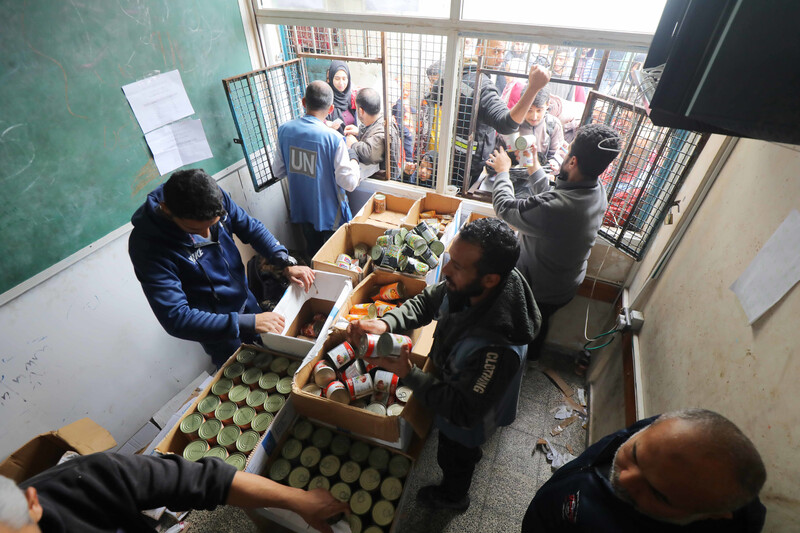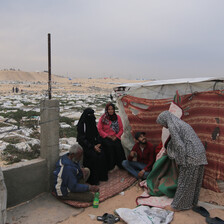The Electronic Intifada 1 February 2024

A school in central Gaza is now serving as a shelter and aid distribution center.
APA imagesPalestinian lives have been on hold since 7 October. Education is no exception.
School and university students are unable to complete their terms. Instead of having their usual winter break, a far longer “break” has been imposed on them by Israel.
The “break” is accompanied by the imminent threat of death.
My brother Mohanned is a second-year medical student at al-Azhar University. Like so many others, his future is uncertain.
The university campus where he attended classes has been bombed and the hospitals where he was supposed to receive training are out of service and, in some cases, badly damaged.
His worries are compounded by the tight siege on Gaza. Even if he were to try and leave, his certificates and documents are now buried beneath the rubble of our house.
Getting these documents issued again will be hard. Israel has bombarded the archives and central servers of the administration in Gaza.
Baraa, another brother of mine, had just one term to go before he would be a computer science graduate.
Now, he does not know when he will obtain the certificate he needs.
Being without the certificate hinders his ability to apply for jobs. That was the very reason he pursued computer science – to escape unemployment.
Even those who managed to flee Gaza face the daunting task of starting anew, mostly bereft of their essential documents.
Empowerment
The Israelis know the pivotal role that education plays in society. That is why they have continuously attacked our schools and colleges.
Buildings at the Islamic University of Gaza (IUG), for example, have been targeted during Israel’s major offensives against Gaza in 2008-9 and in 2014 and again during the current genocidal war.
Palestinians have consistently appreciated education as a central means of empowerment and building a better future.
Despite financial struggles, education has been prioritized.
Palestinians in the occupied West Bank and Gaza have a literacy rate of more than 97 percent. After graduating from university, Palestinians have frequently been successful in business, engineering and medicine, among other fields.
During its current war, Israel has wreaked havoc on the educational infrastructure, demolishing or severely damaging all seven of Gaza’s universities. They include prominent institutions like the IUG and al-Azhar University.
In the latest such outrage, Israa University was blown up by Israel, after using it as a military base and detention facility.
Furthermore, Israel has targeted and killed leading scholars and academics across various disciplines. They include renowned figures such as Sufyan Tayeh, the IUG’s president, and Refaat Alareer, a professor of English literature at the same university.
More than 90 university professors have been killed, according to the Euro-Med Human Rights Monitor.
Given the expertise of those who have been lost, the impact of these killings will be profoundly detrimental to the Palestinian representation in the scientific community.
This loss extends beyond the present moment. Future generations will lose the chance to learn from the experiences of these accomplished individuals.
Killing great minds
Israel kills poets, artists and academics who can mobilize people with their work and give Palestinians a shared cultural sense. The killings are undertaken so that the goals of Zionism – Israel’s state ideology – can be attained.
Zionism is premised on ethnic cleansing. For Palestinians, that means attempts to end our culture, our sense of community, our very existence.
Israel has a 75-year history of killing Palestine’s great minds.
One major example was the assassination of the legendary author and journalist Ghassan Khanafani. Israel killed him – along with his niece – with a car bomb in 1972.
In the current genocidal war, Israel has killed the writer Hiba Abu Nada, the artist Heba Zaqout and the aforementioned Refaat Alareer. Dozens of journalists and thinkers have been killed, too.
Israel has intentionally destroyed schools, claiming the lives of students and teachers. The destruction must be seen as part of an effort to erase knowledge.
Rather than holding classes, schools have been used as makeshift shelters for Gaza’s displaced. In some cases, the Israeli military has transformed them into detention centers.
More than 280 schools run by the Gaza authorities and 65 run by the UN agency for Palestine refugees (UNRWA) have been targeted. That equals 75 percent of all schools across the Strip.
More than 4,300 students and 230 teachers have been killed.
Bayan, another brother of mine, should be preparing for his tawjihi, the final high school exams, this year.
During previous major attacks on Gaza, friends and members of my family kept studying and getting ready for exams.
Back in 2014, the results of the tawjihi were announced while we were in a makeshift shelter. On that occasion, we celebrated how my cousin scored high results.
This war is much worse than previous ones. It is many times more violent.
Israel is killing humans, animals, even trees. It is bombarding schools, universities and hospitals to a greater extent than in earlier offensives.
The attacks on the education system and on the wider civilian infrastructure are part of a genocidal war aimed at rendering Gaza uninhabitable. Israel wants to force Gazans into leaving and is spreading lies about how emigration would be “voluntary.”
The destruction of libraries, archives, museums and architecture are efforts to erase the cultural identity of Palestinians – to give the impression that no Palestinians ever lived in Palestine.
The consequences will be dire.
Opportunities will vanish for so many people. Vast sums of money and a huge deal of time will be required to rebuild destroyed schools and universities.
With some exceptions, the global academic community appears indifferent. It is not taking any meaningful action against the destruction.
In many cases – particularly in the US – academics and universities have effectively sided with Israel. Students and teachers who support Palestine and call for an end to the massacres have been punished.
Despite all the recent destruction, I still believe in the resilience of my people.
When the Islamic University of Gaza was established, many of its lectures were held in tents.
If we can create such important institutions from scratch, we can achieve even greater feats in the future.
Sewar Elejla was formerly a doctor at al-Shifa hospital in Gaza. She is now a Canada-based researcher.





